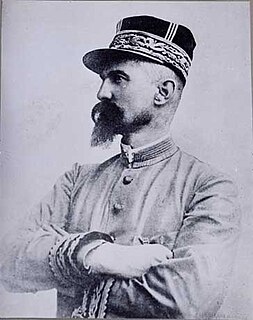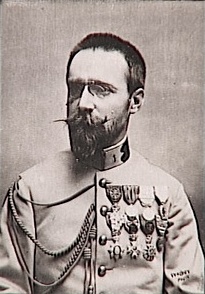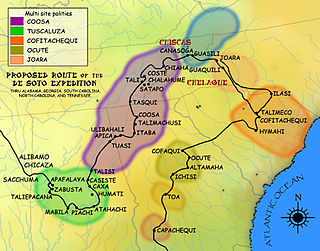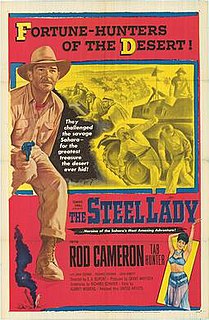
The Battle of Cut Knife, fought on May 2, 1885, occurred when a flying column of mounted police, militia, and Canadian army regular army units attacked a Cree and Assiniboine teepee settlement near Battleford, Saskatchewan. First Nations fighters forced the Canadian forces to retreat, with losses on both sides.

Émile Gentil was a French colonial administrator, naval officer, and military leader.

Birni-N'Konni is a town in the Tahoua Region of Niger, lying immediately north of the border of Nigeria and west of seasonal Maggia River. It is an important market town and transport hub and as of the 2012 census had a population of 63,169. The town is the historic centre of the small pre-colonial Hausa state of Konni. The name comes from the Hausa for "Walled Town of Konni", and many Hausa towns designate the old citadel neighbourhood the "Birni".

The battle of Kousséri originated in French plans to occupy the Chari-Baguirmi region. In 1899–1900, the French organized three armed columns, one proceeding north from Congo, one east from Niger and another south from Algeria. The objective was to link all French possessions in Western Africa, and this was achieved April 21, 1900 on the right bank of the Chari in what is now Chad opposite Kousséri, in what today is northern Cameroon.

The Escapees' Medal is a military award bestowed by the government of France to individuals who were prisoners of war and who successfully escaped internment or died as a result of their escape attempt. The "Escapees' Medal" was established by a 1926 law, intended to honour combatants not only of the First World War, but also of the Franco-Prussian War of 1870. Its statute was later amended to include combatants of the Second World War and later conflicts.

The battle of Kouno was an inconclusive battle that took place between French troops and the Muslim army led by Rabih az-Zubayr, in the context of French colonial expansion in Africa, and more precisely in Chad.

The Voulet–Chanoine Mission or Central African-Chad Mission was a French military expedition sent out from Senegal in 1898 to conquer the Chad Basin and unify all French territories in West Africa. This expedition operated jointly with two other expeditions, the Foureau-Lamy and Gentil missions, which advanced from Algeria and Middle Congo respectively. The refusal of the expedition commander and his second-in-command to follow orders from France, their murder of a commanding officer and their subsequent deaths at the hands of their own soldiers cast a dark shadow over France's emerging colonial empire in Africa at the end of the 19th century. The expedition is remembered for its descent into depravity and extreme violence, actions which today would legally be considered war crimes.

Amédée-François Lamy was a French military officer. He was born at Mougins, in the French département of Alpes-Maritimes on 7 February 1858 and died in the battle of Kousséri on 22 April 1900.

Octave Meynier was a French military officer, born on 22 February 1874 at Saint-Yrieix-la-Perche in France and died on 31 May 1961 at Algiers. He is remembered as one of two officers who took control of the Voulet-Chanoine Mission, which mutinied and rampaged through West Africa in 1899. He fought in the First World War and later launched a number of cross-Saharan motorised expeditions.

Paul-Jules Joalland was a French officer, known mainly for completing the Voulet-Chanoine Mission.

Jean-François Arsène Klobb (1857–1899) was a French colonial officer. He was assassinated by order of Captain Paul Voulet.
Sarraounia Mangou was a chief/priestess of the animist Azna subgroup of the Hausa, who fought French colonial troops of the Voulet–Chanoine Mission at the Battle of Lougou in 1899. She is the subject of the 1986 film Sarraounia based on the novel of the same name by Nigerien writer Abdoulaye Mamani.

Mabila was a small fortress town known to the paramount chief Tuskaloosa in 1540, in a region of present-day central Alabama. The exact location has been debated for centuries, but southwest of present-day Selma, Alabama, is one possibility.
Konni is a traditional Hausa state in what is today south central Maradi Region Niger and north Sokoto State Nigeria. It continues to exist as a ceremonial polity centered on the Nigerien city of Birni-N'Konni.
The infernal columns were operations led by the French Revolutionary general Louis Marie Turreau in the War in the Vendée, after the failure of the Royalist Virée de Galerne. Following the passage on 1 August 1793 and 1 October 1793 by the National Convention of laws, the National Convention stated that the goal was to exterminate "brigands" in the area south of the river Loire, 12 army columns were formed and sent through the Vendée to exterminate the local anti-Republican population. In January 1794, Turreau wrote to the National Convention's Minister for War, to lay out his proposed tactics: "My purpose is to burn everything, to leave nothing but what is essential to establish the necessary quarters for exterminating the rebels." It has been estimated that from 16,000 to 40,000 inhabitants were killed during the first quarter of 1794.

Sarraounia is a 1986 historical drama film written and directed by Med Hondo. It is based on a novel of the same name by Nigerien author Abdoulaye Mamani, who co-wrote the screenplay. The novel and film concern the real-life Battle of Lougou between Azna queen Sarraounia and the advancing French Colonial Forces of the Voulet-Chanoine Mission in 1899. Sarraounia was one of the few African tribal leaders that resisted the advances of French expansionists Paul Voulet and Julien Chanoine. The film won the first prize at the Panafrican Film and Television Festival of Ouagadougou (FESPACO) and was critically well received.

The Nuku Hiva Campaign was an armed conflict between the United States and the Polynesian inhabitants of Nuku Hiva during the War of 1812. It occurred in 1813, following Captain David Porter's decision to sail his fleet to the island for repairs before continuing his raid against British shipping. Upon arrival, the Americans became involved in a tribal war and allied themselves with the Te I'i people against the Happah and Tai Pi clans.

The Steel Lady is a 1953 American action film directed by Ewald André Dupont starring Rod Cameron and Tab Hunter.

The Battle of Lioma was fought between the German Empire and British Empire during the East African Campaign of World War I. Having successfully evaded the Allies since late 1917, the German Schutztruppe under Paul von Lettow-Vorbeck waged a guerilla campaign in Portuguese East Africa, attacking and raiding settlements as well as forts in the search of supplies while inflicting as much damage as possible on the Allies. All the while, the Schutztruppe was chased by the British King's African Rifles, which finally cornered the Germans at the village of Lioma on 30–31 August 1918. Led by George Giffard, the British forces almost managed to encircle and destroy the Schutztruppe, but in the end the Germans broke out and successfully retreated. Although greatly weakened by the fighting at Lioma, the Schutztruppe was thus able to remain active until the end of the war.

Thomas Patrick Payne is a United States Army Delta Force sergeant major and instructor, who was awarded the Medal of Honor for his actions during a hostage rescue mission in an area of northern Iraq controlled by the Islamic State. Payne is currently the only recipient of the Medal of Honor for Operation Inherent Resolve.
















